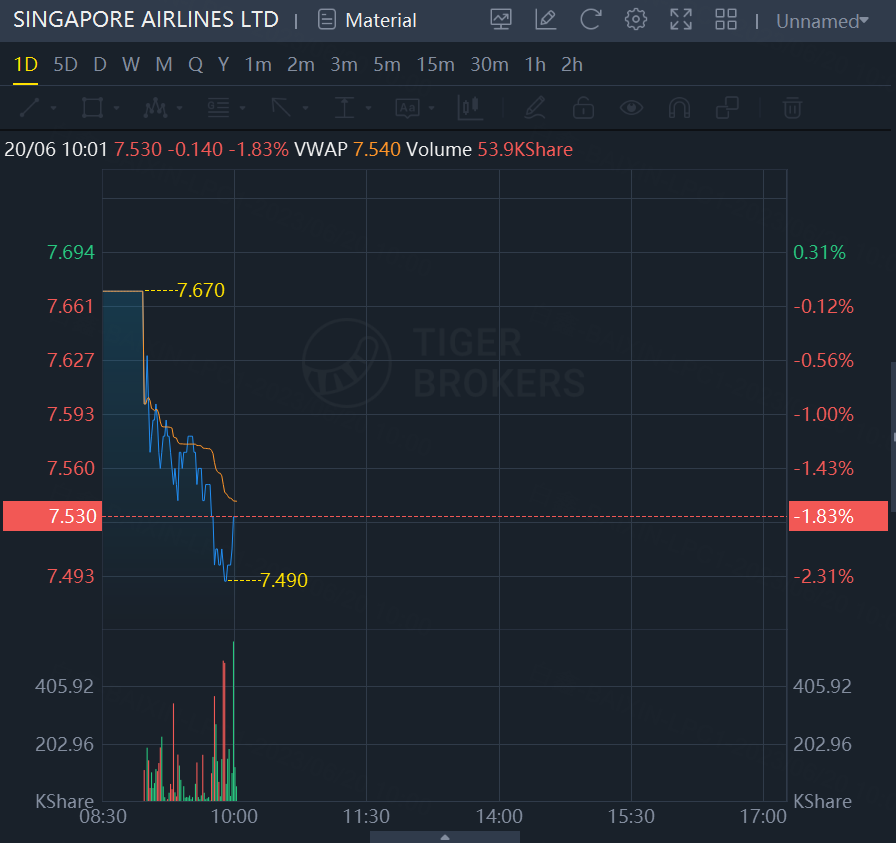Singapore Airlines shares slipped 1.8% as UOB downgrades it to "sell" on its stretched valuation.
UOB Kay Hian analyst Roy Chen has downgraded Singapore Airlines (SIA) to “sell” with a higher target price of $7.07 from $5.75 previously.
The downgrade comes after Chen’s upgrade to “hold” in May after the airline released its results for the FY2023 ended March 31 on May 16.
However, following the share price surge, which gained 31.6% after SIA’s full-year results, Chen notes that SIA’s valuation is “very lofty” with its FY2024 P/B of 1.58x and 2.8 standard deviations (s.d.) above its historical mean. At its current share price levels, SIA’s valuation now matches its historical peak just before the global financial crisis (GFC) and is unlikely to be sustainable in the long run given Chen’s core return on equity (ROE) estimates of 12.1%, 8.5% and 7.0% for the FY2024, FY2025 and FY2026 respectively.
His new target price is “favourably valued” based on an FY2024 P/B of 1.44x, 2 s.d. above SIA’s historical mean.
On the airline’s share price gain, Chen notes that there were two legs. The first took place between May 17 to 22, immediately after SIA’s FY2023 results and driven by the positive surprise of a strong dividend. The second leg of uprun began on June 1, which coincided with the sharp share price decline of the three major Chinese Airlines.
“[The share price decline was] triggered by China Southern Airlines’ (CSA) surprising announcement (on May 31) of raising up to 25.6% of new shares, which has underlined major risks of more earnings per share (EPS)-dilutive equity raisings by the three major Chinese airlines,” says Chen.
“Noting the coincidence of timing, we reckon that some regional funds that previously resided with Chinese airlines may have switched to SIA,” he adds.
Despite the downgrade, the analyst is still positive on SIA’s outstanding performance, making it the best in the region, noting that the airline is fully out of the woods for a year already compared to its close regional peers, which are still struggling with legacy impacts from the pandemic.
“The operation excellence and strong management track record (testified during the pandemic) has allowed SIA to reap a disproportional share of benefits from the regional air travel recovery. SIA has also recently demonstrated its product leadership, offering unlimited Wifi to KrisFlyer members,” says Chen.
SIA’s success is also thanks to the Singapore government, which provided the airline with “timely and adequate support during the pandemic”.
“Beyond that, the pragmatism, professionalism, efficiency and candidacy demonstrated by the Singapore government in the pandemic have earned Singapore due recognition from the global community, leading to the huge wealth influx (recent news about inflows of ultra-high net worth) to Singapore from regional countries (e.g. China). We believe this benefits SIA, which is well-positioned to capture the demand of the growing mid-to-high-end customer group with its premium branding image,” he adds.
In FY2024, Chen is expecting SIA’s earnings to moderate on a y-o-y basis driven by moderating passenger yields, lower cargo yields and weak cargo volume.
However, given the airline’s strong passenger operation data in May and noting the slower-than-expected catch-up by some of its regional competitors, the analyst now expect SIA’s pax load factor and pax yields to stay upbeat for longer.
In the 1QFY2024, Chen is expecting the sharp decline in jet fuel prices (of 19% q-o-q) to provide support to SIA’s core earnings, despite the moderation of passenger and cargo yields.
“Although the benefits of fuel cost savings are likely to be passed down to end-customers in the long run driven by airlines’ competitions, airlines should be able to largely retain the benefits of fuel cost savings in the short-term horizon since their near-term airfare revenue would have been somewhat secured by forward-booking of air tickets,” says Chen.
The analyst is forecasting SIA’s 1QFY2024 net profit to come in at around $600 million to $700 million, compared with its 4QFY2023 net profit of $602 million and 1QFY2023 net profit of $370 million.
In line with his expectations of upbeat passenger load factors and yields staying upbeat for longer, Chen has upped his net profit forecasts for the FY2024, FY2025 and FY2026 by 10%, 31% and 10% to $2.87 billion, $1.24 billion and $1.04 billion respectively.
“Our FY2024 net profit forecast includes a one-off accounting gain of $1.11 billion from the planned Air India-Vistara merger, excluding which SIA’s FY2024 earnings would have been $1.76 billion,” he says.
As at 11.20am, shares in SIA are trading 5 cents lower or 0.64% down at $7.72.

